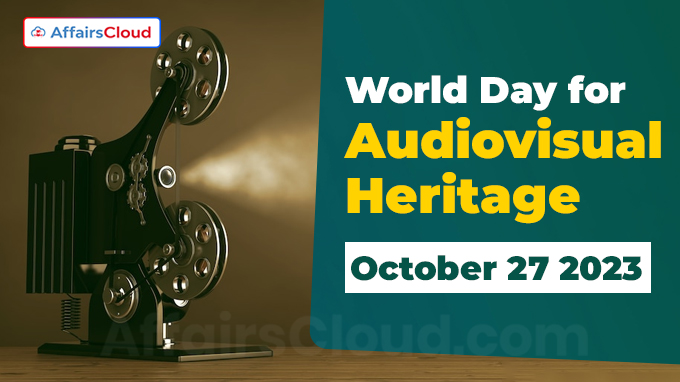 The United Nations (UN) World Day for Audiovisual Heritage (WDAH) is annually observed across the globe on 27 October to remind us of the significance of archiving and preserving Audiovisual (AV) sources, and to honour the AV preservation professionals and institutions that safeguard our heritage for future generations.
The United Nations (UN) World Day for Audiovisual Heritage (WDAH) is annually observed across the globe on 27 October to remind us of the significance of archiving and preserving Audiovisual (AV) sources, and to honour the AV preservation professionals and institutions that safeguard our heritage for future generations.
WDAH also aims to raise general awareness of the need to take urgent measures and acknowledge the importance of AV documents.
- The 2023 theme of WDAH is “Your Window to the World”.
WDAH celebration is a key initiative of the United Nations Educational, Scientific and Cultural Organization (UNESCO) and the Coordinating Council of Audiovisual Archives Associations (CCAAA).
Background:
i.In 2005, UNESCO adopted the resolution (33 C/Resolution 53) during the 33rd session of the UNESCO General Conference held in Paris, France, and proclaimed the 27 October of every year as the World Day for Audiovisual Heritage (WDAH).
ii.The resolution also commemorated the 25th anniversary of the adoption of the Recommendation for the Safeguarding and Preservation of Moving Images.
- “Recommendation for the Safeguarding and Preservation of Moving Images”, was adopted in 1980 by the 21st UNESCO General Conference in Belgrade, Serbia.
ii.The first-ever WDAH was observed on 27 October 2006.
UNESCO/Jikji Memory of the World Prize:
i.UNESCO’s Executive Board approved the establishment of the UNESCO/Jikji Memory of the World Prize in April 2004.
ii.The purpose of the prize is to commemorate the inscription of the world’s oldest existing book of movable metal print, the Buljo Jikji Simche Yojeol, inscribed in the Memory of the World Register.
iii.The prize honors endeavors that contribute to safeguarding and facilitating access to documentary heritage, emphasizing its collective value for all of humanity.
iv.Aligned with UNESCO’s vision, the prize underscores the organization’s mission to promote universal access to information and knowledge.
About Audiovisual Heritage:
i.AV documents, such as films, radio and television programs, and audio and video recordings, contain the primary records of the 20th and 21st centuries.
ii.Serving diverse audiences, these documents have transformed communication, acting as a vital supplement to written history.
iii.The vulnerability of these records demands urgent digitization to prevent further irreversible loss.
UNESCO’s Digitization Initiative:
i.AV archives serve as invaluable repositories of global heritage, offering insights into diverse cultures and people worldwide.
ii.In 2015, UNESCO launched Digitizing Our Shared UNESCO History, a fundraising project to digitize the Organization’s archives.
- The archives date back to its predecessors, including the League of Nations’ International Institute for Intellectual Cooperation.
iii.The project underscores the significance of safeguarding and promoting this collective memory for current and future generations.
About Coordinating Council of Audiovisual Archives Associations (CCAAA):
Chair– Mary Egan (Representing FOCAL International)
Established in– 1981
Members– 9




